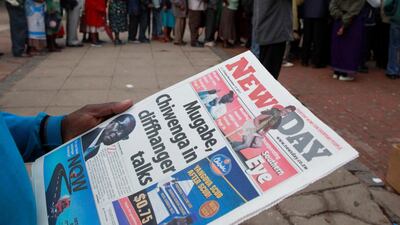A casualty of Zimbabwe's military coup is the stock market bull run, with nearly US$6 billion (Dh22bn) of value wiped off local shares this week.
In the topsy-turvy world of Zimbabwean economics, local share prices rise as investor uncertainty grows; and the Zimbabwe Stock Exchange is viewed as a safe haven, particularly during times of rising inflation.
Since July the value of shares has risen from around $6bn to $16bn, ZSE figures show. This timeframe coincided with an inflation surge as Zimbabwe ran out of physical cash money. Zimbabwe uses the US dollar as its currency after scrapping its own unit in 2009 to put an end to hyperinflation.
In recent months, banks have struggled to meet cash demand as dollars flowing into the economy dried up. The government has introduced bond notes - essentially local currency. However, consumers remain wary of the notes and the preference is for foreign money.
As a result, inflation began to quicken, reaching anywhere between 20—200 per cent, depending on the goods and services involved. This sent investors fleeing to the stock market.
The result was a growth in prices of stocks that did not support their underlying value. Old Mutual Zimbabwe, the local unit of the London and Johannesburg listed financial services firm, was trading at three times that of its parent in the UK.
Old Mutual's fungability – that is, the fact that its shares bought or sold in Zimbabwe could be settled in London or Johannesburg – made it particularly attractive. Consequently, Old Mutual Zimbabwe is one of the biggest losers on the ZSE, giving up almost 20 per cent a day since Friday.
Another stock that saw gains was Delta Corporation, Zimbabwe's largest beverage maker. It began trading this year at just under a dollar, and by October reached $3,20. Beverage stocks traditionally perform well in times of financial stress because consumers tend to maintain spending levels while cutting back elsewhere.
Delta is also one of the few businesses that are at near full production. Much of Zimbabwe's production capacity is limping along, using dated equipment. However, Delta too has taken a beating this week, giving up nearly all its gains of the past two months.
Vince Musewe, a Harare based economist says the speed of political events unfolding has however caught many by surprise, which could lead to a return to shares.
"The market fall was because investors overreacted to the news of the coup expecting things to prolong an unstable and uncertain situation," Mr Musewe said. "Nobody expected this issue to be resolved within two weeks."

